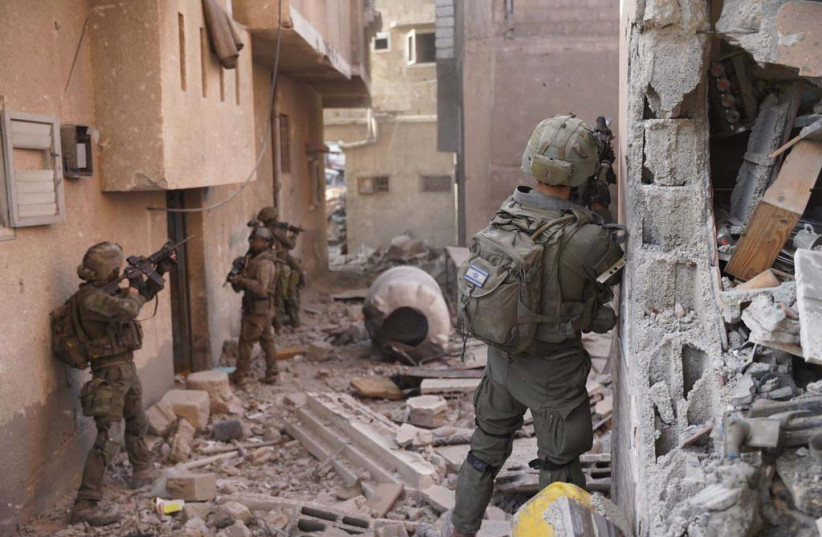Night has fallen on Khan Yunis. The deceiving silence is interrupted every now and then by bombings, precision-strike missiles, and tanks returning to their posts. The surroundings have been completely destroyed. Within every destroyed house, there is proof of the extraordinary level of equipment and paraphernalia relating to the terror that had been planned and supported by Gazan civilians, including tunnel shafts, ammunition, and propaganda. These are shocking, as the IDF has only been north of Gaza City in recent operations, and yet Khan Yunis, located in the south, is also filled with such hatred and terror.
Although the battles are well-planned and slowly executed, everyone is determined to achieve their operational objectives. For a month now, Reserve Brigade 55 of the Paratroopers has been operating against Hamas terrorists and cleaning up the area of Khan Yunis, from where many of the terrorists who committed the most heinous atrocities in the Kibbutzim Nir Oz, Nirim, and Ein Hashlosha came.
We have been here for 100 days, since the tragic Shabbat of October 7. We moved from the north to the south of Gaza, and as our exhaustion levels have risen, so too have our spirits, which remain just as high. Our soldiers and commanders still have the strength to continue fighting for many more days to come, on additional fronts should that be necessary, as long as it provides quiet and security for Israel in the coming years.
But it is not only the pain and trauma of the battlefield that this generation will have to carry on its shoulders. This war with Gaza was forced upon Israeli society at one of its most difficult moments, at a time of extreme division. Every single person in Israel had a clear opinion and often showed a vicious disregard for those who thought differently. A 5-minute conversation could not be held civilly. We have been used to saying that only a war could make us united once again, but the enormously painful way that this war broke out brought a drastic, sudden, and hopeful change to our ability and capacity to live side by side, and to properly argue.
For three months now, I have lived among soldiers from all walks of life. In all honesty, I do not know their political, social, or religious opinions and it really doesn’t matter. Now we are together and searching for the common threads between us. Although it does not come across on the news, this is the truth on the battlefield, whether in Golani, infantry, Paratroopers, or combat engineering.

We are all working together to defeat the terror organization Hamas. Each one of us has an opinion about the future of the State of Israel and judicial reform, but the last few months have provided for us an important lesson in truly understanding what it means to set aside our differences and focus on what is really important.
CURRENTLY, ISRAELI society and influential public figures are leading a discussion between the “before,” focusing on October 6 and bringing us back to our previous arguments, and the “after,” discussing the day after the war. Ideas, concerns, and hopes have been thrown into the air and many people have been urging and encouraging each other to discuss “the day after,” as it is easier than dealing with the difficulties and challenges of the present.
Fighting to avoid returning to the toxic social climate before Israel-Hamas War
But perhaps we ought to be concentrating on the present. The toxic environment that was here prior to the war is not something that any of us long to return to, and the future of Gaza and the State of Israel is foggier and more unclear than ever it was. Not only that, but the current reality that has unfolded during these past few months brings forth a feeling of new hope. A feeling of high spirits of hundreds among the thousands of reserve soldiers who were called to serve their country and their society – a feeling that could bring a fresh start and much-needed rejuvenation to Israeli society.
Israeli society must enter a new era. A society that understands that the security threats around us, will prevent us from arguing and bickering. We don’t have the privilege at the moment to be able to argue with one another, even if this means that important decisions will have to wait, perhaps only to be made in the next generation.
The present also provides hope for Israeli and Diaspora relations. The commitment of Jewish communities worldwide is at its peak – higher than it has been for many years. Despite the alarming rise in antisemitism worldwide, Jewish community leaders have been openly vocal about their support for Israel, leaving their disagreements to the side.
This is an opportune moment, and it is our duty to build a new social covenant with our brothers and sisters abroad. This bridge must connect Jews to Israel, the Jewish state. The strong support for Israel, whether that be financial or emotional, shows that all of our hearts are in the same place right now. It is our duty to create new programs and opportunities that will connect us all, for all the Jewish people share the same fate.
The war in Gaza and Lebanon will come to an end in a few weeks or a few months, God willing. However, our internal social struggles and challenges require us to find renewed strength. This incredible generation that has been fighting with such a spark in their eyes, also has the capability to lead this crucial mission as well, the mission of social unity, which starts today. The day before tomorrow.
The writer is a commander of the IDF combat communication unit, Brigade 55, and head of the Diaspora Department at the World Zionist Organization.
